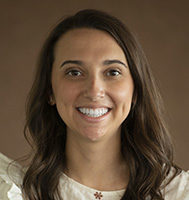Q&A with Rachel Streckert, MD, assistant professor, Division of Hospital Medicine and Complex Care
 Hometown: New Castle, Pennsylvania
Hometown: New Castle, Pennsylvania
Educational/professional background: I earned my undergraduate degree in biology from Wheaton College in Wheaton, Illinois, and my doctor of medicine degree from the Medical College of Wisconsin Central Wisconsin campus in Wausau, Wisconsin.
Previous position (title, institution): Chief Resident, University of Wisconsin School of Medicine and Public Health, Department of Pediatrics
What is your field of research or area of clinical care, and how did you get into it? I will be working within the Division of Hospital Medicine and Complex Care. My younger brother was born with medical complexity, and I saw firsthand how difficult it can be for families to navigate the medical system. This experience sparked my interest to help other patients and families with this process.
How would you describe your work to a 5-year-old? I help kids who have to go to the doctor or have sleepovers at the hospital a lot. I try to make sure they feel better and don’t have to be in the hospital as much, so they can spend more time playing, laughing, and being with their families and friends.
What attracted you to UW–Madison? I had never been to Madison before starting my residency here in 2021. I have come to love the city, and the people I get to work with are a huge reason for that. Living by the water and Memorial Union Terrace is a plus, too!
What is your favorite thing to do in Madison? I love spending time with my husband and son at the Memorial Union Terrace and the Henry Vilas Zoo!
What’s one thing you hope trainees will learn from you and your work? I want them to know that we can learn so much from our patients and their families, which can make us better doctors.
Do you feel your work relates to the Wisconsin Idea? If so, please describe how. Working to see how the medical system can better serve patients with medical complexity and their families helps to serve those in our community, state, nation, and world. Working together and sharing what we learn helps this population.
What’s something interesting about your area of expertise you can share that will make us sound smarter during video chats and parties? Children with medical complexity represent less than 1% of all children, but they account for more than one-third of all pediatric health care spending in the U.S.
What are some of your hobbies and other interests? Running and reading